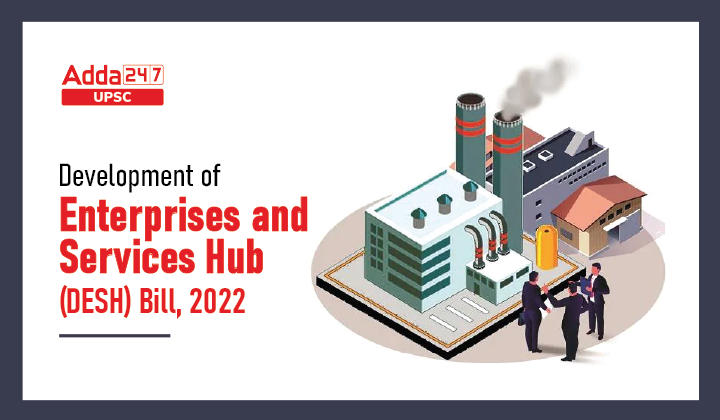Table of Contents
DESH Bill 2022- Relevance for UPSC Exam
- GS Paper 2: Governance, Administration and Challenges
- Government policies and interventions for development in various sectors and issues arising out of their design and implementation.
DESH Bill 2022 in News
- Recently, a Workshop on Development of Enterprises and Services Hub (DESH) Bill, 2022 was organized by Department of Commerce in Vanijya Bhawan, New Delhi to have discussion on the DESH Bill with stakeholders from various segments.
DESH Bill 2022- Key Features
- The new DESH Bill 2022 will replace the existing law governing Special Economic Zones (SEZs).
- The announcement of a new law was made by Finance Minister Nirmala Sitharaman in the Union Budget in February 2022.
- Development Hubs: Such hubs will also include existing SEZs. Draft DESH Bill seeks to set up “development hubs” for-
- Promoting economic activity,
- Generating employment,
- Integrating with global supply and value chains and maintaining manufacturing and export competitiveness,
- Developing infrastructure facilities,
- Promoting investments, including in research and development (R&D).
- Enterprise and Service Hubs: Development hubs will be further classified into enterprise and service hubs.
- While enterprise hubs will permit both manufacturing and services activities, services hubs will permit only services activities.
- Infrastructure Status: Government plans to give these hubs infrastructure status, at par with sectors such as road, rail waterways, airports to improve access to finance and enable long-term borrowing from lenders at easier terms.
- Single-Window Portal: An online single-window portal has also been provided under the draft DESH Bill for the grant of time-bound approvals for establishing and operating the hubs.
- Simplifying rules: Development of Enterprise and Service Hubs (DESH) will be freed from many of the rules that burden SEZs: for instance-
- They will no longer be required to benet foreign exchange positive and
- They will be allowed to sell in the domestic market much more easily.
- WTO Compliant DESH: The units operating within the new hubs will no longer benefit from direct tax incentives, which will be scrapped — a move that will make the hubs compliant with World Trade Organization rules.
- Promoting Domestic Manufacturing: development hubs will be allowed to sell outside the demarcated area or in the domestic market with duties only to be paid on the imported inputs and raw materials instead of the final product.
Special Economic Zones- Key Points
- About Special Economic Zone (SEZ): It is an area within a country’s national borders in which the business and trade laws are different from the rest of the country.
- Key Purpose: SEZs are established for different purposes like increasing trade balance (by promoting export), employment, increased investment, job creation and effective administration.
- The SEZs are expected to be engines for economic growth.
- Relaxation offered by the government in SEZs: government formulates various financial policies to encourage businesses to set up in the SEZs. These policies are typically related to investing, taxation, trading, quotas, customs, and labour regulations.
- In the initial period, the government often offers tax holidays (a period of lower taxation).
- The government also ensures the ease of doing business in these areas.
National Centre for Disease Control (NCDC)
Special Economic Zones in India
- Origin:
- Asia’s first EPZ (Export Processing Zones) was established in 1965 at Kandla, Gujarat.
- SEZs are similar in structure to EPZs.
- Indian SEZs are modeled on the success of Chines SEZs.
- The government began to establish SEZs in 2000 under the Foreign Trade Policy to redress the infrastructural and bureaucratic challenges that were seen to have limited the success of EPZs.
- Legislative backing: The Special Economic Zones Act was passed in 2005 to provide legislative support to SEZs. The Act came into force along with the SEZ Rules in 2006.
- SEZs Act 2005: “It is defined as an Act to provide for the establishment, development and management of the Special Economic Zones for the promotion of exports and for matters connected therewith or incidental thereto.”
- Between 2000-2006, SEZs were operational under the Foreign Trade Policy.
- Present status: 379 SEZs are notified by the government, out of which 265 are operational.
- Regional Distribution of SEZs in India: about 64% of the SEZs are located in five states- Tamil Nadu, Telangana, Karnataka, Andhra Pradesh and Maharashtra.
- Baba Kalyani Committee: It was constituted by the Ministry of Commerce and Industry to study the existing SEZ policy of India and had submitted its recommendations in November 2018.
Special Economic Zones (SEZs) in India



 TSPSC Group 1 Question Paper 2024, Downl...
TSPSC Group 1 Question Paper 2024, Downl...
 TSPSC Group 1 Answer key 2024 Out, Downl...
TSPSC Group 1 Answer key 2024 Out, Downl...
 Cabinet Ministers of India 2024, New Cab...
Cabinet Ministers of India 2024, New Cab...







